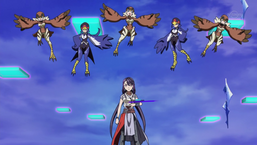Difference between revisions of "Lyrilusc"
| Line 54: | Line 54: | ||
===[[Extra Deck]]=== | ===[[Extra Deck]]=== | ||
{| class="wikitable sortable" | {| class="wikitable sortable" | ||
| + | ! scope="col" | [[Card type]] | ||
! scope="col" | Lyrilusc | ! scope="col" | Lyrilusc | ||
| − | |||
! scope="col" | Origin | ! scope="col" | Origin | ||
|- | |- | ||
| + | | [[Fusion Monster|Fusion]] | ||
| + | | [[Lyrilusc - Independent Nightingale|Independent Nightingale]] | ||
| + | | [[wikipedia:Red-billed leiothrix|Japanese nightingale]] | ||
| + | |- | ||
| + | | rowspan=2 | [[Xyz Monster|Xyz]] | ||
| [[Lyrilusc - Assembled Nightingale|Assembled Nightingale]] | | [[Lyrilusc - Assembled Nightingale|Assembled Nightingale]] | ||
| − | + | | [[wikipedia:Red-billed leiothrix|Japanese nightingale]] | |
| − | |||
| − | |||
| − | |||
| − | |||
|- | |- | ||
| [[Lyrilusc - Recite Starling|Recite Starling]] | | [[Lyrilusc - Recite Starling|Recite Starling]] | ||
| − | |||
| [[wikipedia:Starling|Starling]] | | [[wikipedia:Starling|Starling]] | ||
|} | |} | ||
Revision as of 22:38, 10 August 2017
"Lyrilusc", known as "Lyrical Luscinia" (
Contents
Design
Appearance
Similar to the "Harpie" monsters, the "Lyrilusc" monsters consist of female monsters with bird features. They appear to wear a full-body costume based on the birds of their namesake. The Main Deck monsters have a child-like appearance, while the Extra Deck monsters have an adult-like appearance.
Etymology
Its name in the OCG reference, Luscinia, is a genus of smallish passerine birds, but each of them belongs to different families of this genus. The base character used for its Japanese name "Lyrical Luscinia" ("LL") is similar to the one used for "Raidraptor" ("RR"), reflecting that these archetypes are used by the Obsidian siblings.
The names for each Main Deck member contain both a blue mineral/gemstone and a passerine. The former may a reference to the fact that Lulu's Japanese name, Ruri, means "lapis lazuli".
Members
Main Deck
| Lyrilusc | Origin | |
|---|---|---|
| Gemstone | Bird | |
| Cobalt Sparrow | Cobalt | Sparrow |
| Sapphire Swallow | Sapphire | Swallow |
| Turquoise Warbler | Turquoise | New World warbler |
Extra Deck
| Card type | Lyrilusc | Origin |
|---|---|---|
| Fusion | Independent Nightingale | Japanese nightingale |
| Xyz | Assembled Nightingale | Japanese nightingale |
| Recite Starling | Starling |
Playing style
The "Lyrilusc" archetype consists of Level 1 monsters focused on Rank 1 Xyz Summon tactics. They possess swarming and searching effects to aid quickly Summoning their Xyz Monster, "Lyrilusc - Assembled Nightingale", whose ATK and number of direct attacks quickly increase with the more monsters the player manages to gather to Summon it. With enough Xyz Materials, "Assembled Nightingale" can quickly OTK your opponent without much problem. Otherwise, it can be used as Fusion Material for "Lyrilusc - Independent Nightingale", whose ATK and burn effect can also become massive depending on the number of Xyz Materials attached to the fused monsters.
Weakness
Despite their ability to quickly bring out their main powerhouse and massive protection against battle, targeting, and effect destruction, cards that can negate their effect or flip them face down such as Skill Drain or Swords of Concealing Light will shut them down.
Recommended cards
Recommended cards (pending additional support)
| ||||
|---|---|---|---|---|
|
Example Decks
Official "Lyrilusc" Deck
|
|---|
